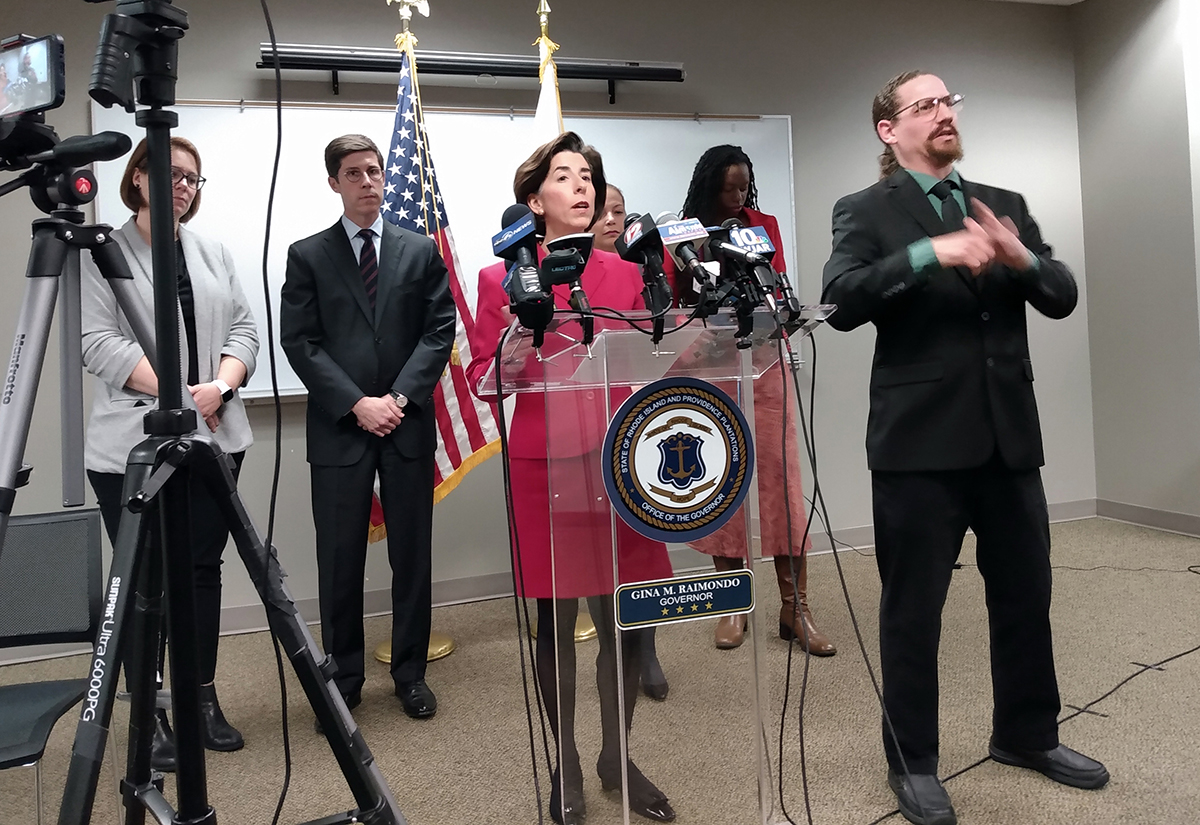State governors are typically not front and center during a national crisis. But the COVID-19 pandemic spreading across the U.S. has pushed governors to figures of national prominence, in part because the Trump administration has said states will need to help find their own personal protective equipment and medical supplies to combat the infections.
And it is state leaders who are closing businesses, universities and schools, as well as public spaces where people can gather in large numbers.
Gov. Gina M. Raimondo, who moved quickly to recognize the pandemic as a statewide emergency, generally has received praise from political observers for her leadership in taking swift steps to close businesses and encourage people to avoid large groups, admonishing those who have been slow to listen.
While the decisions have pounded the state’s economy, and drove nearly 50,000 people to file unemployment claims within the first two weeks of the crisis, many Rhode Islanders have remained patient as the governor in daily briefings outlines the coronavirus spread and steps being taken to prevent the viral infection from overwhelming the state’s health care system.
Raimondo, a Democrat, has acted effectively as a crisis leader, said Gary Sasse, founding director of the Hassenfeld Institute for Public Leadership at Bryant University and an occasional critic of Raimondo’s decision-making.
‘It’s been the most effective leadership she’s demonstrated in her five years in office.’
GARY SASSE, Hassenfeld Institute for Public Leadership founding director
“It’s been the most effective leadership she’s demonstrated in her five years in office,” said Sasse, who also served as director of administration under former Republican Gov. Donald L. Carcieri. “She’s effectively communicating. Her communications are credible, they’re fact-based. They’re based on data, not speculation.” Before five people in Rhode Island were infected with the virus that causes the respiratory disease, Raimondo declared COVID-19 a statewide public health emergency.
Then she moved quickly to limit public meetings and conferences to 250 people, then to smaller numbers, effectively shutting down all convention and business meetings. More recently, she activated the R.I. National Guard, which is now stationed at T.F. Green Airport, directing people arriving on domestic flights to self-quarantine for 14 days.
So far, Rhode Island has avoided becoming a hot spot compared with other densely populated Northeastern states such as New York and Massachusetts.
But has she acted appropriately to contain the public health threat, or overreached in shutting down swaths of the economy?
Wendy Schiller, a professor of political science at Brown University, said the governor has been proactive since the first two cases were diagnosed in the state. “And as important, [Raimondo] has been open, transparent and accessible about what steps the state is taking, and why,” she said.
As for the balance of health and economy, Schiller said: “It is impossible to know for any governor how to weigh the economic impact of business closure against trying to save lives. She is erring on the side of safety, but even she acknowledges there will be a time when business has to reopen before we are completely out of the woods on COVID-19.”
Some restaurateurs were miffed after Raimondo ordered all dine-in eateries closed, with the promise that she’d make it up to them. But then she refused to waive the combined 8% state sales and meals tax that restaurants had to submit by March 20.
Bob Burke, a co-owner of Pot au Feu in Providence, had lobbied for the tax to be waived, but he said later he understood why she refused to relinquish the tax dollars. “I think to ask someone to make a decision of that magnitude in 72 hours, with everything going on, I understand,” he said.
The anger was blunted when she soon signed an executive order that allowed restaurants to sell beer and wine with takeout orders, also something that Burke had pushed for.
Burke said Raimondo’s demeanor during the crisis has given people confidence. But he’s worried about the unintended consequences of her actions. For his industry, that includes the potential of killing off successful restaurants.
“As with all government regulations that end up being made quickly, there are a lot of unintended consequences,” he said.
Mary MacDonald is a PBN staff writer. Contact her at Macdonald@PBN.com.











